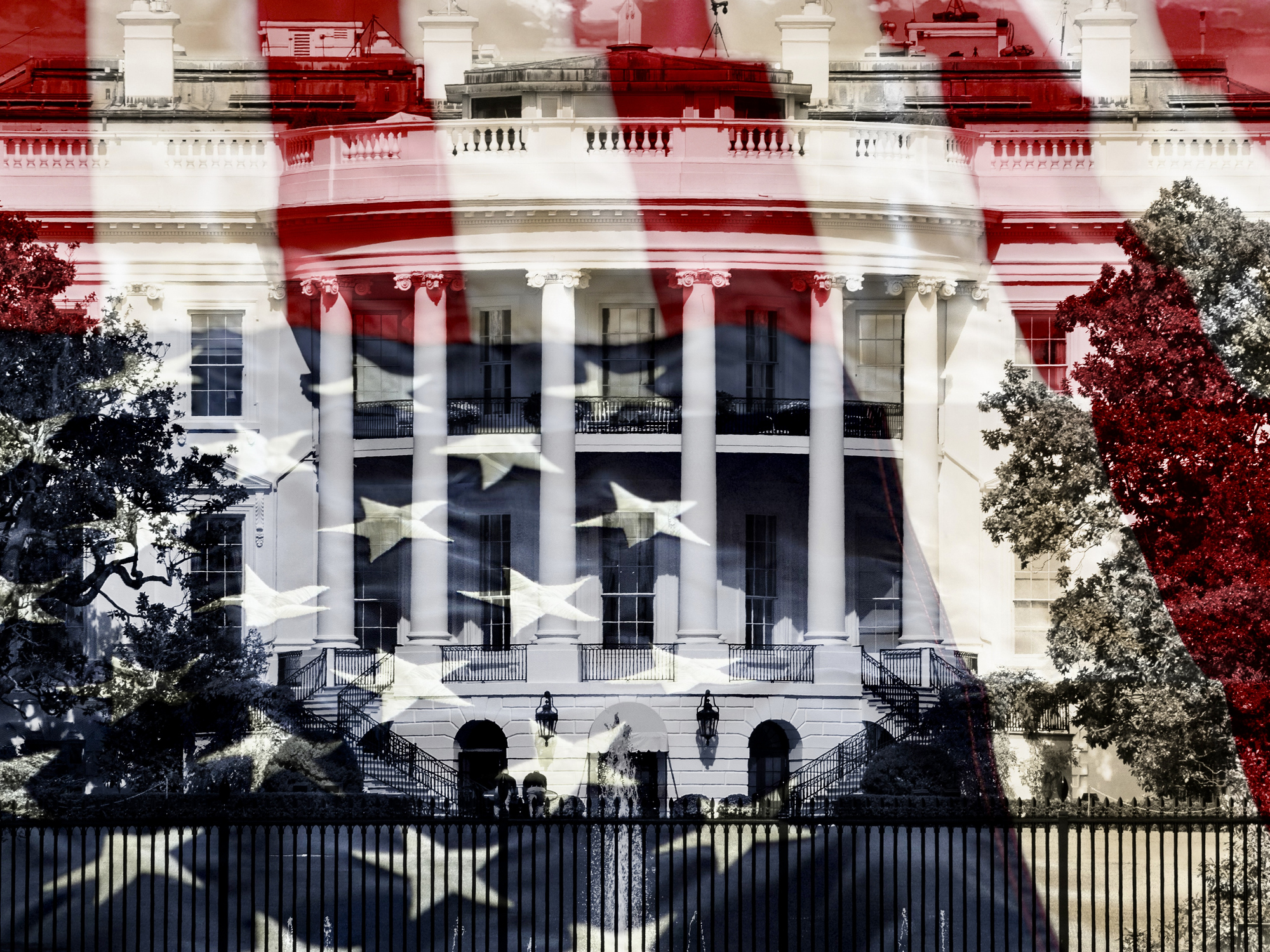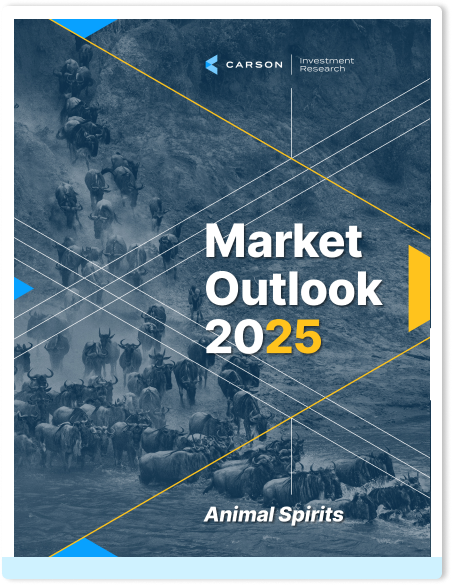The 2024 Republican National Convention ended on Thursday with former President Donald Trump’s acceptance of his party’s nomination. We also can’t ignore the other events in the last several weeks, including the contemptable attempt on former President Trump’s life and the ongoing uncertainty about President Joe Biden’s candidacy following his poor debate performance on June 27. Despite the elevated political uncertainty, markets have taken it all in stride and have been more focused on shifting inflation expectations and the path of interest rates. (See our Chief Market Strategist Ryan Detrick’s discussion of recent small cap strength here, and our VP, Global Macro Strategist Sonu Varghese’s thoughts on the market’s reaction to inflation progress here.)
Even though markets are often driven by broader economic forces, the policy context is still important and we’ve written quite a lot about the election and its potential impact on markets. For our full suite of election content and relevant blogs, see Carson Investment’s election landing page. We also take an in depth look at the election in our recently released Midyear Outlook 2024.
So here we are. There are 108 days left until election day on November 5, but in fact it’s even closer. Voting starts as early as mid-September in some states and nearly every state has some form of early voting, which has become widely used. Over the last few cycles, a little less than half of all ballots have been cast before election day, on average, so the start of the election is really just around the corner.
So let’s jump in with some of the issues on everyone’s minds…

Stay on Top of Market Trends
The Carson Investment Research newsletter offers up-to-date market news, analysis and insights. Subscribe today!
"*" indicates required fields
Will He Stay or Will He Go?
The Democratic National Convention will take place on August 19 – 22 in Chicago. There is still a lot of uncertainty over who the candidate will be, but it’s important to keep in mind that President Biden ran the table in the largely uncontested Democratic primaries and has won nearly every delegate. Ultimately, it’s his decision whether or not to give up the nomination, but he’s facing considerable pressure to drop out that continues to build.
Pundits’ and prediction markets’ assessment of the likelihood that President Biden will be the Democratic nominee has swung wildly since the debate, but it’s become increasingly likely (but by no means certain) that he will drop out of the race. The conventional wisdom is that a younger candidate can champion the Democratic party’s platform, or at least provide an alternative to former President Trump, without the concerns about age-related decline that have weighed on President Biden since the debate. At the same time, President Biden continues to stand by his record, including defeating former President Trump head-to-head in an election while also flipping the Senate to Democratic control. There are also risks to a switch unrelated to the quality of the new candidate, such as the distraction (and wasted energy) associated with the transition and uncertainty about how voters will respond to the candidate once they are under the spotlight.
We use prediction markets, election models, polls, and changes in betting odds to gauge the reaction to political events. A word of caution about these sources. They are useful way to get real time feedback and provide useful information, but are as much a measure of shifts in near-term sentiment as they are predictive. These “odds” could also be widely misinterpreted as having a much higher degree of certainty than is actually represented by the number itself. More than a forecast, it a prediction market like Polymarket is likely better seen as one of the better aggregators of all available information to this point, in my opinion, including polls.
Prediction markets, election models, and professional oddsmakers assessment of the election outcome did not shift much immediately post-debate, on average, even as concerns grew about President Biden’s candidacy. But as the pressure on President Biden has increased, and the president has dug in, the odds of a victory for former President Trump have risen. On Polymarket, former President Trump’s odds of winning were at about 56% pre-debate (pretty close to a coin flip) peaked at 72% post-debate as President Biden dug in, and has dropped to 63% as the likelihood of President Biden dropping out increased sharply in the last 24 hours.
There have also been concerns about down-ballet effects, which have contributed to increased pressure on President Biden by Congressional members and donors. The pre-debate odds of a Republican sweep in Polymarket was 42%, rose as high as 55%, and has fallen back down to 46% in the last 24 hours.
All in all, while the odds have shifted towards pre-debate levels as the likelihood of President Biden dropping out has increased, it has not fully reversed.
Too Early to Think About 2026?
We are often asked why election outcomes usually don’t have a predictable broad market impact. As we said above, part of it is just that economic forces are more powerful. 10 of the last 11 recessions have started under Republican presidents. We think this really has nothing to do with the policy views of the presidents, but it has had an impact on markets under their presidencies. Another important factor is policy isn’t forever. If policies don’t land well, there’s an opportunity to change them in two years. In fact, with a roughly evenly divided electorate the frequency with which elections have changed the balance of power in Washington has hit a record over the last 20 years.
The Worst Job in Politics
People say that being vice president is one of the worst jobs in politics. All the work, much of the blame, but what glory there is belongs to the president. Often only heading into elections do vice presidents get a little love, and the position has been in the news a lot lately. One highlight of the Republican convention was the selection of Ohio Senator J.D. Vance as former President Trump’s running mate. Meanwhile, current Vice President candidate Kamala Harris is the favorite in predication markets to become the Democratic presidential nominee should President Biden drop out.
Vice presidents do receive more attention than usual around elections, but generally have relatively little impact on policy and little to no impact on the election outcome despite all the hoopla. (There are exceptions in both cases.) There are really two areas where vice presidents matter most. They can become future presidents and they cast the tie-breaking vote in the Senate.
31% of vice presidents, or 15 of 49, eventually have become president. Eight of those are due to the death of a president, whether through natural causes or the national tragedy of a president lost to assassination. Of those eight, four went on to win a presidential election. In addition, Gerald Ford became president when Richard Nixon resigned. So 10 of 49 vice presidents have gone on to win a presidential election, while an additional 5 have become president only through line of succession.
In a closely divided Senate, the vice president’s most important job may be breaking ties in the Senate. The vice president is one extra Senate vote that is determined by the outcome of the presidential election, and this year Senate control could be determined by that single vote. That impacts committee leadership and composition and control of agendas, but also legislative outcomes. According to the Senate’s web site, the vice president has cast a deciding Senate vote 299 times. Only three have had to break a tie 20 or more times: John Adams (29), John C. Calhoun (31), and Kamala Harris (31).
At this point, the most unusual thing about the election continues to be on-going uncertainty about the Democratic nominee, although having a contest between two historically unpopular candidates as measured by approval ratings is also noteworthy. In our view, the presidential election is likely to drift back toward a near toss up if the Democrats change nominees. That shouldn’t have a large impact on House odds, which remain near a toss up. The likelihood of a shift in Senate control remains high, but by no means a lock, and could be determined by the winning presidential ticket.
Our takeaways? First, we encourage everyone to vote, because ultimately that’s what decides election. Second, it’s my opinion that we should prepare mentally to stay invested no matter the election outcome. I believe abandoning markets due to what is viewed as an undesirable political outcome has not been an effective investing strategy. Put more faith in businesses’ ability to adjust in a variety of policy environments than in the potential incompetence of government. And know if the outcome seems undesirable, we’ll be doing it again in two years, and in any case, markets have taken shifts in power in stride, and will likely continue to do so.
For more content by Barry Gilbert, VP, Asset Allocation Strategist click here.
02329757-0724-A



